Pork is meat from domestic pigs. Its red color can be attributed to the presence of myoglobin, a heme protein (1). Various vitamins, minerals, and protein are responsible for the many benefits of pork. It can be eaten freshly cooked or in the form of preserved food items like ham, bacon, and sausages. Moderate intake of pork may offer several health benefits. This article explores the health benefits, nutritional breakdown, and the risks associated with pork. We also discuss some easy and delicious recipes you can try. Keep reading.
Did You Know?Historians estimate that the Chinese were the first to domesticate and consume pork around 7,000 BCE.
In This Article
Pork Nutrition Facts
Pork offers you similar nutrients as beef, but often with less fat and calories, depending on the cut of the meat and preparation. According to the USDA, 3.5 ounces (100g) of cooked, ground pork contains the following vitamins, minerals, and nutrients (2):
| Calories | 297 |
| Protein | 25.7g |
| Fat | 20.8g |
| Carbohydrates | 0 |
| Fiber | 0 |
| Sugar | 0 |
| Calcium | 22mg |
| Iron | 1.29mg |
| Phosphorus | 226 mg |
| Potassium | 362 mg |
| Sodium | 73mg |
| Zinc | 3.21mg |
| Selenium | 35.4 µg |
| Vitamin C, total ascorbic acid | 0.7 mg |
| Thiamin | 0.706 mg |
| Riboflavin | 0.22 mg |
| Niacin | 4.21 mg |
| Vitamin B-6 | 0.391 mg |
| Folate, total | 6 µg |
| Choline, total | 88.3 mg |
| Vitamin B-12 | 0.54 µg |
Pork is an excellent source of protein and iron. The heme-iron found in red meats is easily absorbed by the human digestive system as compared to the plant non-heme iron (3).
Related: 14 Home Remedies For Digestive Problems And Prevention Tips
Pork is also a good source of vitamins and important minerals like selenium, phosphorus, and thiamine. Pork meat cuts are actually richer in thiamine than beef or lamb meat. There was also a 15% retention of thiamine in cooked pork meat than any other red meat (4).
Pork also has a significant amount of B-vitamins. Vitamins B6 and B12 are crucial for blood cell formation and brain function ( 5).
With the above nutrient content, pork provides us with a number of potential health benefits.
Potential Health Benefits Of Pork
Minimally processed, fully-cooked lean pork when eaten in moderation can provide you with a number of health benefits. Some of them are explained below.
- May Help Muscle Maintenance
The high-quality proteins in pork provide you with essential amino acids that act as building blocks for new muscles. With age, especially after 50 years, there’s a loss and degeneration of muscle mass, a condition otherwise known as sarcopenia. Intake of high-quality pork protein along with a healthy lifestyle may help slow down or reverse the effects of sarcopenia (6).
Related: 6 Benefits Of Amino Acids For Skin, How To Use, & Side Effects
- May Increase Muscle Performance

Shutterstock
The pork proteins help regenerate new muscle mass and help maintain and improve the performance of healthy muscles. Pork is rich in the beta-alanine protein compound carnosine that helps lower fatigue and improves physical fitness (7), (8).
- May Help Cells Grow And Function
Pork is rich in the B-vitamins— thiamin, niacin, riboflavin, vitamin B12, and B6 (9). These B-vitamins help the body convert food into energy. They are essential for the brain and nervous system to help make DNA, hormones, and red blood cells.
B-vitamin deficiency has also been shown to lead to anxiety, depression, and other types of mental illnesses (5). Vitamin B12 in particular has been found to play a potentially important role in helping prevent depression (10),(11).
- May Help Lose Weight

Shutterstock
Pork meat is rich in protein and has no sugar or carbohydrates making it suitable for low-carb weight-loss diets like the Ketogenic diet (12). Additionally, regular consumption of lean pork meat has been found to have promising effects in fat reduction and weight loss (13).
Related: How To Lose Weight Fast For Women – 21 Best Ways
Having understood the benefits of pork, let’s now have a look at the potential risks associated with pork consumption.
Potential Risk And Adverse Effects Of Pork
- Can Be High In Sodium And Saturated Fats
While pork is rich in important vitamins and minerals, it can also be high in sodium and saturated fats. When processed, pork meat goes through a curation process which includes the addition of salt and preservatives. To avoid salt and saturated fat intake, you can opt for a minimally processed, lean variety of pork (with the visible fat lining trimmed off).
- Might Increase The Risk Of Cancer
When the pork meat is subjected to high heat like grilling or barbeque, it might result in the formation of carcinogenic compounds called heterocyclic amines (14).
Bacon and some other cured pork products might contain chemical preservatives like nitrates and nitrites which have also been linked with potential risks of cancer (15).
- Might Contain Parasites
Raw or undercooked pork might contain parasites that can cause serious infections in humans when consumed (16).
- Taenia solium, or pork tapeworm, is one such intestinal parasite that causes a disease called cysticercosis. It affects the human nervous system leading to epileptic seizures.
- Trichinosis, an infection caused due to the parasitic roundworms called Trichinella, is another possible infection from raw or undercooked pork.
- Another similar infection found in the pork production chain is yersiniosis, caused due to contamination with the Yersinia enterocolitica bacteria (17).
The best way to avoid these infections is to handle the raw pork meat carefully. You should wash your hands with soap before and after handling the meat and cook it to a temperature of about 163°F (71°C) to kill any parasites that may be present in it.
Further ahead let’s discuss the safety measures you should keep in mind while handling pork.
Subscribe
Storage And Food Safety
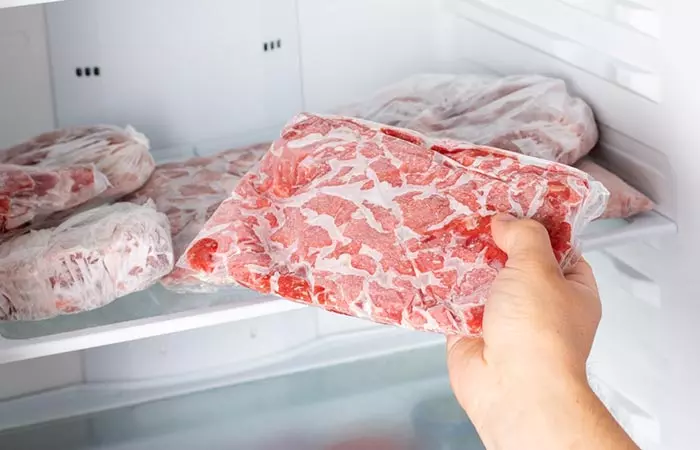
Shutterstock
The following measures can help you avoid contamination and possible risks and infections:
- Store raw pork meat sealed in clean containers, preferably on the fridge’s bottom shelf, so the meat doesn’t touch or drip onto any other food.
- Follow the storage instructions on the meat package label and do not consume meat past its expiry date.
- Cook the meat to an internal temperature of 145°F to 163°F.
- If you are cooking meat for later use, let it cool first and then freeze or refrigerate it.
- Keep any cooked meat separate and away from raw meat and when needed reheat the cooked meat only once.
- Thoroughly wash and clean hands, plates, knives, utensils, and other surfaces that come in contact with raw meat. Use soap and warm water preferably.
- You can also seal and freeze fresh pork meat with freezer wrap, for use within six months.
You can enjoy pork in place of chicken or other lean protein in salads, tacos, soups, and stir-fries. Mentioned below are a few popular recipes to get you started.
Pork Recipes
1. Easy Pork Sliders

Shutterstock
Ingredients
- Pork mince – 500 g
- Garlic (crushed)- 2 cloves
- Ginger (grated) -1 tablespoon
- Lemongrass paste -2 teaspoons
- Sweet chili sauce – 3 teaspoons
- Spring onions (finely chopped) – 2
- Mint ( finely chopped ) -¼ cup
- Kale slaw (with seeds and dressing) -350g
- Slider buns (split) -12
- Lime wedges (to serve)
Instructions
- Combine pork mince, garlic, ginger, lemongrass, chili sauce, spring onion, and mint in a large bowl.
- Season well with salt and pepper.
- Shape 4 tablespoons of mixture each into patties (makes around 12).
- Spray a large chargrill or non-stick frying pan with oil.
- Heat over medium-high flame.
- Cook the patties, in batches, for 2-3 minutes on each side or until cooked through.
- Combine slaw with seeds and half the dressing.
- Divide the slaw between buns and top with patties.
- Serve with extra mint, chili sauce, remaining dressing, and lime wedges.
Stylecraze TriviaYou can also add mustard powder, smoked paprika, dried basil, five-spice powder, or thyme to your pork mince to enhance the flavor.
2. Honey Soy Pork Skewers

Shutterstock
Ingredients
- Pork loin steaks (cut into 2 cm pieces) – 550 g
- Honey – 3 tbsp
- Soy sauce – 60ml (1/4 cup)
- Garlic clove – 1
- Sesame oil – 2 teaspoons
- Mirin – 2 teaspoons
- Red onion (cut into wedges) -1
- Green capsicum (cut into 2cm pieces) – 1
Instructions
- Take pork in a large bowl and add in the honey, soy, garlic, sesame oil, and mirin.
- Toss well to combine.
- Cover with plastic wrap and leave aside to marinate for at least 10 minutes.
- Thread pork pieces onto skewers, alternately with onion and capsicum.
- Preheat a barbecue grill or flat plate.
- Spray the skewers with oil.
- Cook skewers over medium-high heat for 2-3 minutes on each side, brushing with reserved marinade, until golden and just cooked through.
- Serve warm with rice.
To wrap up, we leave you with a few fun facts about pork.
Know Your Pork Facts
- Pork is a forbidden food in certain religions such as Islam and Judaism.
- Pigs breed all around the year, so pork production is a continuous cycle.
- Pork has more protein than chicken and is high in zinc, iron, and B-vitamins.
- The leanest cuts of pork have the word loin in them, such as pork tenderloin or loin chop.
- A pig’s squeal can range from 110-115 decibels, a Concorde jet is usually under 112 decibels.
Fun FactCelebrities like Chrissy Teigen, Elizabeth Banks, Cardi B, and Cameron Diaz love eating pork rinds.
Infographic: What Are The Different Cuts Of Pork?
Pork is the most commonly consumed red meat of domestic pigs. However, each cut of pork meat has a different nutritional profile. So, knowing all the cuts of pork is essential while selecting the meat. There are four major primal cuts of pork such as shoulder, belly, leg, and loin. Click on the infographic below to learn further.

Illustration: StyleCraze Design Team
Pork is popular meat from domestic pigs. It is rich in many vitamins, minerals, and proteins that help treat many ailments. Pork benefits your health in a multitude of ways. It may help with muscle maintenance, increase muscle performance, and prevent depression. However, it may increase the risk of cancer due to the presence of nitrites and cause serious infections due to parasites. Hence, choose minimally processed pork and consume it in moderation to avoid its negative effects.
Frequently Asked Questions
Is pork fat healthy or unhealthy?
Excess consumption of pork fat may prove to be unhealthy. Pork fat is high in saturated fat, which may lead to cardiovascular and cerebrovascular disorders (18).
Why is pork the most consumed meat?
Pork is a good inexpensive source of protein. It has many cuts of meat that can be prepared and consumed in different ways.
Are pork chops good for you?
Yes. Pork chops are usually lean meat, and they are packed with many beneficial nutrients that are good for your health (19).
Key Takeaways
- Pork contains less fat and calories than beef and is a good source of protein, vitamins, minerals, and iron.
- It could aid muscle maintenance and performance, increase cell growth and function, and promote weight loss.
- However, some cuts of pork are high in sodium and unsaturated fats.It could also increase the risk of cancer and may contain parasites.
- That said, you could practice certain storage and safety tips to steer clear of contamination, risks, and infections.
References:
Articles on StyleCraze are backed by verified information from peer-reviewed and academic research papers, reputed organizations, research institutions, and medical associations to ensure accuracy and relevance. Read our editorial policy to learn more.
- Myoglobin chemistry and meat color
https://pubmed.ncbi.nlm.nih.gov/23190143/ - Pork, fresh, ground, cooked
https://fdc.nal.usda.gov/fdc-app.html#/food-details/167903/nutrients - Absorption of heme iron
https://pubmed.ncbi.nlm.nih.gov/9460807/ - Aspects of meat quality: Trace elements and B vitamins in raw and cooked meats
https://www.researchgate.net/publication/223594691_Aspects_of_meat_quality_Trace_elements_and_B_vitamins_in_raw_and_cooked_meats - B Vitamins and the Brain: Mechanisms Dose and Efficacy—A Review
https://www.ncbi.nlm.nih.gov/labs/pmc/articles/PMC4772032/ - Role of dietary protein in the sarcopenia of aging
https://pubmed.ncbi.nlm.nih.gov/18469288/ - Contents of creatine, creatinine and carnosine in porcine muscles of different metabolic types
https://pubmed.ncbi.nlm.nih.gov/22063033/ - Effect of beta-alanine supplementation on muscle carnosine concentrations and exercise performance
https://pubmed.ncbi.nlm.nih.gov/20091069/ - Contents of vitamins B1, B2, B6, and B12 in pork and meat products
https://www.researchgate.net/publication/257165096_Contents_of_vitamins_B1_B2_B6_and_B12_in_pork_and_meat_products - Folate and B12 serum levels in association with depression in the aged: a systematic review and meta-analysis
https://www.tandfonline.com/doi/abs/10.1080/13607863.2015.1049115?journalCode=camh20 - Systematic review and meta-analysis of randomized placebo-controlled trials of folate and vitamin B12 for depression
https://www.ncbi.nlm.nih.gov/pubmed/25644193 - Ketogenic diet for weight loss
https://www.ncbi.nlm.nih.gov/labs/pmc/articles/PMC6371871/ - Effects of Eating Fresh Lean Pork on Cardiometabolic Health Parameters
https://www.ncbi.nlm.nih.gov/labs/pmc/articles/PMC3407990/ - Heterocyclic amine content of pork products cooked by different methods and to varying degrees of doneness
https://pubmed.ncbi.nlm.nih.gov/9651045/ - Dietary Nitrates, Nitrites, and Nitrosamines Intake and the Risk of Gastric Cancer: A Meta-Analysis
https://www.ncbi.nlm.nih.gov/labs/pmc/articles/PMC4690057/ - Parasites associated with pork and pork products
https://pubmed.ncbi.nlm.nih.gov/9501363/ - Enteropathogenic Yersinia in the Pork Production Chain: Challenges for Control
https://ift.onlinelibrary.wiley.com/doi/full/10.1111/1541-4337.12108 - Effects of Dietary Pork Fat Cooked Using Different Methods on Glucose and Lipid Metabolism, Liver Inflammation and Gut Microbiota in Rats
https://www.ncbi.nlm.nih.gov/pmc/articles/PMC8701267/ - Pork, fresh, loin, sirloin (chops), boneless, separable lean only, cooked, broiled
https://fdc.nal.usda.gov/fdc-app.html#/food-details/168310/nutrients
Was this article helpful?
Related
The following two tabs change content below.
- Reviewer
- Author

Varsha Patnaik
Varsha holds a master’s degree in biotechnology from Ravenshaw University, Cuttack, and is a certified diet and nutrition coach. She… more
Jamie Rinaldi
(RD)Jamie Elizabeth Rinaldi is a regional dietitian for Nutrition Management Services Company, a professional writer for Todays’ Dietitian magazine and… more



 Is Coconut Meat Good For Your Health?
Is Coconut Meat Good For Your Health?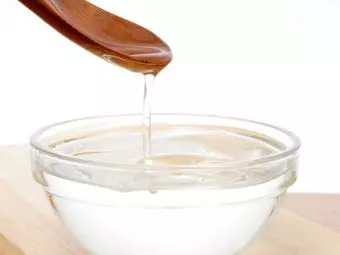 5 Benefits Of MCT Oil And The Best Ways To Use It In A Keto Diet
5 Benefits Of MCT Oil And The Best Ways To Use It In A Keto Diet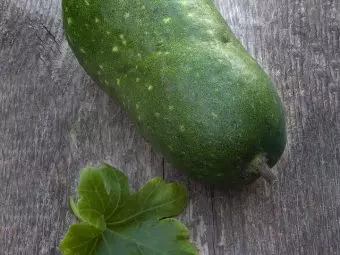 Winter Melon: Nutrition, Benefits, Side Effects, & Precautions
Winter Melon: Nutrition, Benefits, Side Effects, & Precautions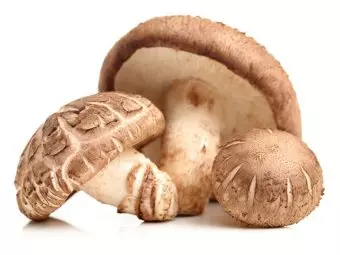 Shiitake Mushrooms: Nutritional Information, Benefits, And Side Effects
Shiitake Mushrooms: Nutritional Information, Benefits, And Side Effects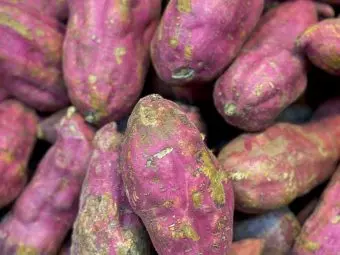 Health Benefits Of Purple Yam You Must Know About
Health Benefits Of Purple Yam You Must Know About Top 5 Health Benefits Of Scallop And Its Nutrition Facts
Top 5 Health Benefits Of Scallop And Its Nutrition Facts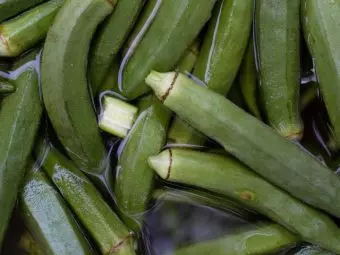 5 Important Health Benefits Of Okra Water Backed By Science
5 Important Health Benefits Of Okra Water Backed By Science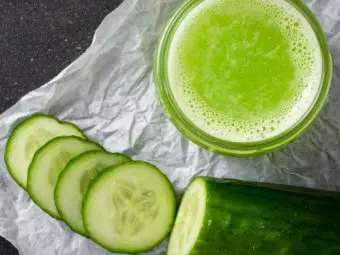 Cucumber Juice: Benefits, Nutrition, And More
Cucumber Juice: Benefits, Nutrition, And More 9 Amazing Health Benefits Of Donkey Milk You Need To Know About
9 Amazing Health Benefits Of Donkey Milk You Need To Know About